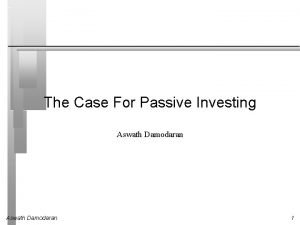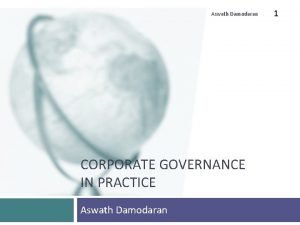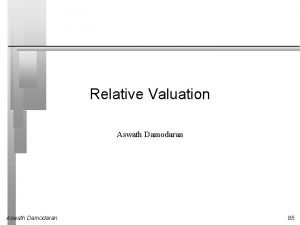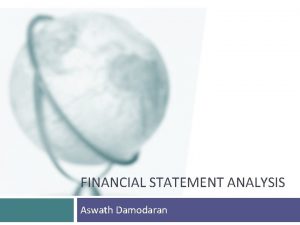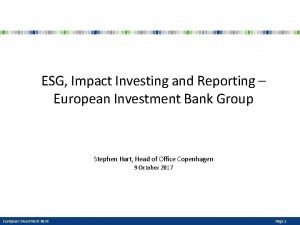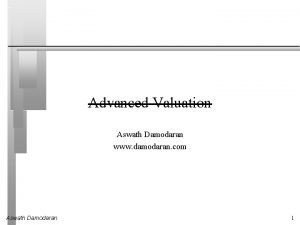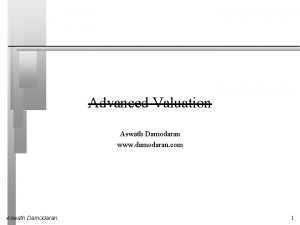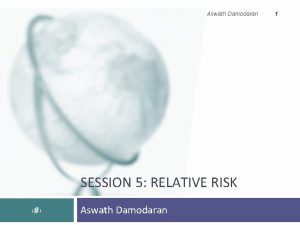Aswath Damodaran THE GRAND FINALE 1 The Closing








- Slides: 8

Aswath Damodaran THE GRAND FINALE ‹#› 1

The Closing Argument 2 Aswath Damodaran 2

Back to the very beginning: Approaches to Valuation Discounted Cashflow Valuation, where we try (sometimes desperately) to estimate the intrinsic value of an asset by using a mix of theory, guesswork and prayer. Relative valuation, where we pick a group of assets, attach the name “comparable” to them and tell a story. Contingent claim valuation, where we take the valuation that we did in the DCF valuation and divvy it up between the potential thieves (equity) and the victims of this crime (lenders) 3

Picking your approach: Depends on the asset that you are “valuing” Marketability: Assets that are marketable are more easily priced than assets that are not. Cash flow generating capacity: Assets that do not generate cash flows (collectibles, fine art and even gold) can only be priced, not valued. Uniqueness: Assets that are unique (and don’t have comparables) are more difficult to price tha assets that are not. 4

Depends on you 5 Time horizon: The longer your time horizon, the better your odds with intrinsic valuation. As your time horizon gets shorter, you will find pricing work better for you. � Reasons for doing the valuation: If you are attaching a number to an asset to facilitate a transaction (an IPO, an acquisition), your job is pricing. If you attaching a number to an asset or business, because you intend to collect the cash flows from that asset over its life, you should be using intrinsic value. � Beliefs about markets: If markets are generally right, on average, but wrong on individual assets, you can price assets. If markets can make systemic mistakes (across entire groups of stocks), intrinsic valuation works better. � Aswath Damodaran 5

Acting on your number: It is not just an academic exercise a. b. c. I am not sure yet: Uncertainty is not a shield against action. If you wait until you feel “certain” about your valuation, you will never act. All believers now? Ultimately, you have to believe in some modicum of market efficiency. Markets have to correct their mistakes for your valuations to pay off. The law of large numbers: Assuming your valuations carry heft, you are far more likely to be right across many companies than on any individual one. 6

Story Tellers? Number Crunchers? If you are a story teller, I hope that you have � More confidence in your number crunching � More discipline in your stories � Less intimidation, when confronted with number crunchers If you are a number cruncher, I hope that you have � More willingness to put stories behind your numbers � More imagination in your number crunching � More understanding, when confronted with story telling 7

Some Not Very Profound Advice 1. 2. 3. 4. 5. Its all in the fundamentals. Focus on the big picture. Don’t sweat the small stuff and don’t get distracted. Anecdotes mean little and experience does not equal knowledge. Keep your perspective. It is only a valuation. In investing, luck dominates skill and knowledge. 8

